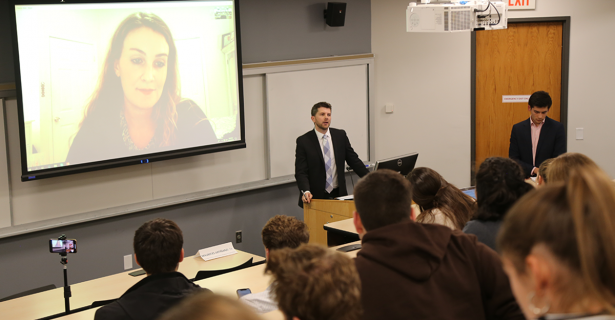The Tufts Latin American Committee (LAC) hosted its second panel of the semester on the Colombian peace process and its connection to security in Latin America. The panel featured Tufts alumni Mauricio Artiñano (A’06, EPIIC’04) of the United Nations Verification Mission in Colombia and Helaina Stein (A’10, EPIIC’08) of the United States Mission to the Organization of American States (OAS). Through Artiñano’s and Stein’s respective experiences with the region, the panel explored the context of the Colombian conflict, the current state of affairs surrounding the peace agreement, and the future of the peace process given domestic and international developments.
Panel moderator and LAC Programming Chair Vladimir Proaño kicked off the panel with a brief overview of the Colombian conflict. Proaño contextualized the Revolutionary Armed Forces of Colombia’s (FARC) origins and expansion as well as its weakened position upon entering negotiation processes with the Colombian government. The three failed negotiation attempts between the armed group and the government were noted before introducing the peace agreement approved by both parties in 2016. Proaño concluded by citing the recent call to arms issued by dissenting FARC-EP leaders this past August.
Following the overview of the conflict, each panelist presented on their work and experiences in the region. Artiñano first explained the UN Verification Mission’s purpose of verifying two components of the peace agreement that concern the reintegration of FARC-EP fighters into Colombian society and the implementation of security guarantees for former combatants. Through the lens of the Verification Mission, Artiñano spoke to the unique nature of the Colombian peace process. Artiñano pointed to the agreement’s tripartite mechanism composed of representatives from the FARC, the Colombian government, and the United Nations that works to verify both parties’ continued commitment to the agreement. Artiñano also outlined the process’s distinctive use of collective reintegration that is taking place in 24 communities throughout Colombia. Within these communities, former fighters are using their extensive geographical knowledge of the region to take up projects such as ecotourism and farming. Speaking on these productive projects, Artiñano shared an anecdote of one group of former FARC combatants and local community members that came together to become white-water rafting certified, eventually going on to represent Colombia at the white water rafting international championships in Australia.
Through her work with the OAS, Stein provided another means by which to view the role of multilateralism in the domestic peace process. The assistance of the OAS, like the UN, was requested by the Colombian government to monitor and support the peace process. Stein explained that the OAS MAPP initiative provides reports to the Colombian government regarding developments on the ground within communities in Colombia. Stein also spoke of the OAS’s support of Colombia’s removal of anti-personnel mines throughout the country. Incorporating a wider regional perspective, Stein discussed Nicolas Maduro’s alleged aiding and abetting of armed groups that reject the peace process which in turn, along with the current instability in Venezuela, poses a potential threat to the longevity of the peace process.
Challenges to the future of the peace process were again raised when audience members were given the opportunity to ask the panelists their own questions. Questions generated by the audience centered on the state of Colombian domestic leadership and specifically cited the violence towards community leaders since the signing of the peace agreement and accusations that the Colombian government has not upheld all of its commitments to the agreement. Stein emphasized the necessity of providing former combatants with improved livelihoods and security so that they do not feel compelled to turn to violent crime. Artiñano responded by acknowledging that the peace agreement is extensive, meaning that some commitments will take generations to be fully met. In the immediate future, Artiñano stated that the government must expand into power vacuums left by the FARC in order to maintain control of the use of legitimate force within the country.
While peacebuilding in Colombia does face challenges, both Artiñano’s and Stein’s insights show that there is hope for what Stein referred to as a “historic process.” Both panelists highlighted the reintegration of former fighters into Colombian society, both for its current successes and potential to further limit conflict going forward. The power of multilateral support was also emphasized by both speakers throughout the panel and illustrated that the scope of the peace process is not limited to the Colombian borders, but rather extends to include the international community, both in Latin America and beyond.

